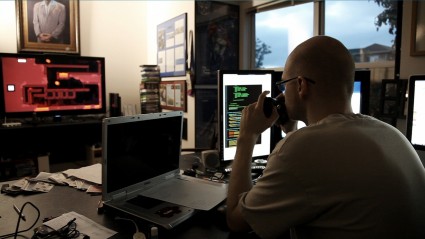Editorials
Indie Game: The Movie’s Old-Fashioned Sensibilities
October 18, 2012, Author: Adam Boffa
“Indie Game: The Movie” is an eminently 2012 experience. A crowdfunded, independent documentary about indie games both released and (at the time of filming) not yet released, both its production and its subject matter are thoroughly modern. It is a strikingly well-produced look at the struggles these indie game developers faced and features an emotional core that is difficult to resist.
Yet it also frequently finds itself stuck chasing tired cinematic ideals instead of providing a more fully-dimensional view of the process these developers went through.
This is not to say that it is a bad movie. In many ways, it is a very good movie. It compellingly weaves together a number of personal stories, adding a wonderful human element to three of the most important indie games of the past few years: Braid, Super Meat Boy, and Fez. Through in-depth interviews with the creators of these titles, the filmmakers show that indie game development is often far more than just a career choice and instead becomes a complete lifestyle commitment.
Each title is at a different stage in its life-cycle, which helps add some perspective to the stories being told: Phil Fish’s difficulties with finishing Fez may have seemed insurmountable without the benefit of watching Ed McMillen and Tommy Refenes put the final touches on Super Meat Boy, and likewise, Jonathan Blow’s post-mortem discussion of Braid helps show that life goes on after the last-minute development stresses and release date hysteria.
The filmmakers edit and pace these elements in a way that maintains tension and creates real emotional investment for the viewer, and seeing the success of Super Meat Boy (the only title that is released during the course of the film) is powerful and fulfilling, even though many viewers will likely already know of its massive sales and near-universal acclaim by now. In that sense, this is great filmmaking.
My problem with the film is that it ends up being almost overwhelmingly somber in its tone. Obviously, that this is a documentary means the material presented here is factual, but all documentarians wield enormous power when deciding which aspects of their subjects’ lives they choose to highlight and how they choose to present them. In this case, the focus is placed squarely on creating a sense of intense seriousness, and almost every scene and sequence takes on larger-than-life severity and importance. The result seems almost exaggerated at times. Are viewers really supposed to believe that these guys spend most of their time coding in complete darkness, silhouetted by the light from their windows?

This is just how Jonathan Blow spends his afternoons.
I do not mean to suggest that the problems faced by these developers, both personal and business-related, are not serious. My issue is that the film shows comparatively little of the actual process of developing an indie game, and as a result, it turns these developers’ love of making games into something that looks more like a burden. There is certainly a lot of misery involved in working in any sort of creative or technical medium, but there is also a lot of joy found in the daily routine and fulfillment found in the minutiae. I don’t have much interest in watching these guys program for two hours, but this film desperately needs more representation for the positive aspects of the love and passion the developers clearly have for simply working on video-games.
The unfortunate consequence of these cinematic decisions is that the film turns these very real people into less-real archetypes, like the “underdog” and the “tortured artist.” These are archetypes that can be compelling and emotionally resonant, but they are not exactly representative of the experiences of real human beings. They become caricatures, like when Fez’s Phil Fish gives a narration against a series of underwater shots of him submerged in a hotel swimming pool with his glasses on. It seems slightly absurd, and might make a viewer question whether the movie is actually interested in indie game developers or in something else entirely.
Characters like the “tortured artist” are tired pop culture tropes, and it’s a little disappointing to see a movie like this become so entangled with maintaining them. In an age where these developers can all be reached instantaneously thanks to Twitter, it seems bizarrely old-fashioned that this movie would be more interested in creating these towering figures of Romantic-era artistic ideals than in treating its viewers to more well-rounded portraits of its subjects.

The portrait of Kramer in the background almost ruined this moment, so his head was (thankfully) cropped out.
Maybe I am wrong and maybe Mr. Fish would like to be remembered as the guy who said he’d kill himself if Fez never saw release. I do not doubt his sincerity there, just like I do not doubt the anguish Mr. Refenes and Mr. McMillen went through during those last few weeks of Super Meat Boy development and release, when they crunched to meet deadlines for a Microsoft promotion only to find their game missing from that promotion on release day. That is brutal, heartbreaking stuff. However, I know they must also have loved other aspects of their work.
I think these people, like creators and artists of all types, find real frustration and grief in their daily grind, but also real happiness. That’s part of what makes them successful and makes these stories so great, but relatively little of it is shown in Indie Game: The Movie. Yes, it creates a set of narratives that are interesting and sympathetic, but those narratives follow a set of rules and a framework that I feel have worn out their welcome.
With new developments like crowdfunding and the rise of independently financed and developed video-games, we have paved the way for seemingly limitless opportunities. We do not need to keep telling the same stories we’ve told before, and I’d love to have seen a more balanced look at the experiences and personalities behind these games. Indie Game: The Movie is an intriguing and emotional experience, but I’m not so sure it’s the one that’s needed in 2012.
Tagged Braid, edmund mcmillen, Fez, indie game the movie, jonathan blow, phil fish, super meat boy, tommy refenes


